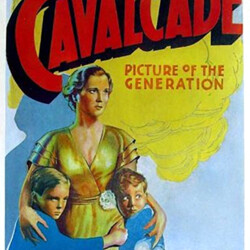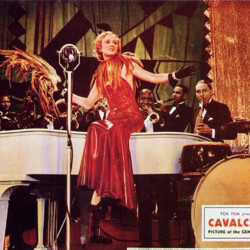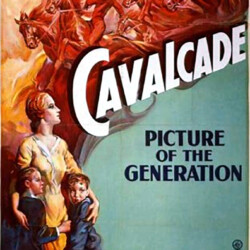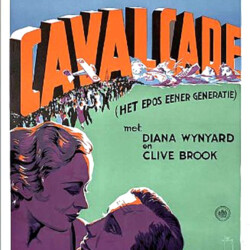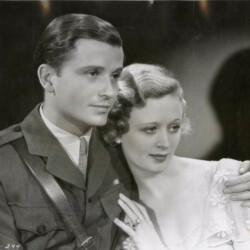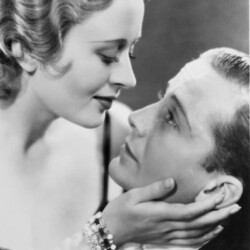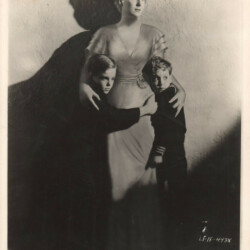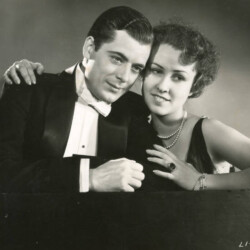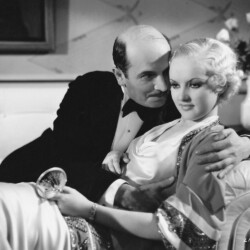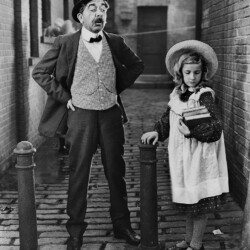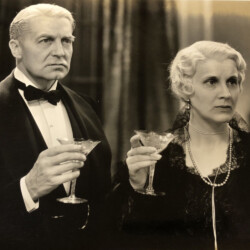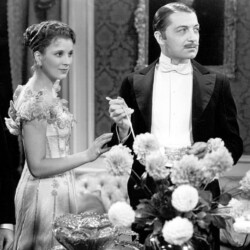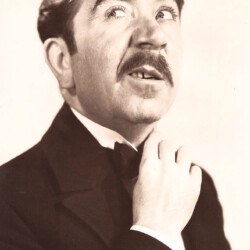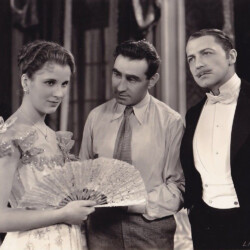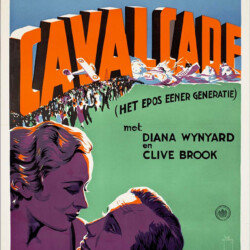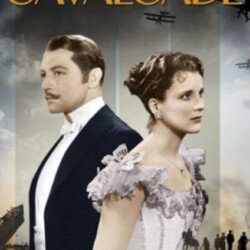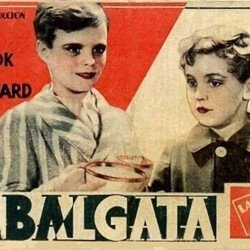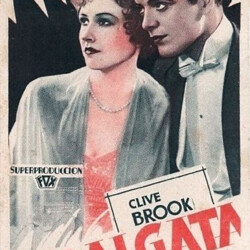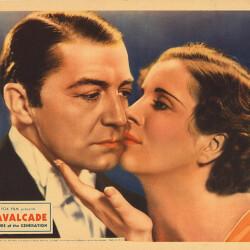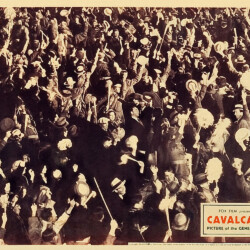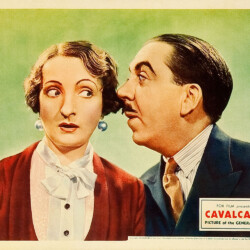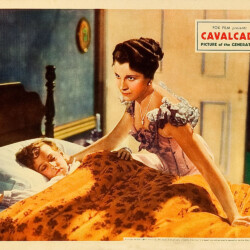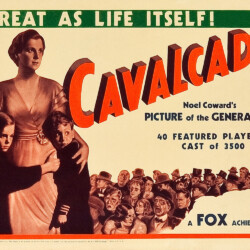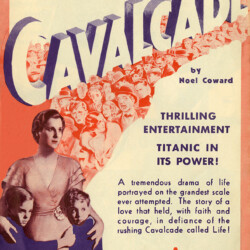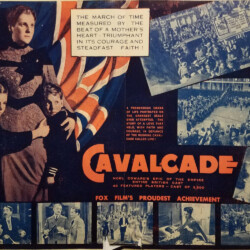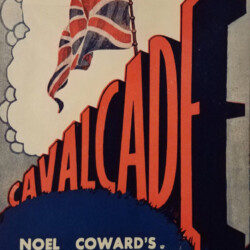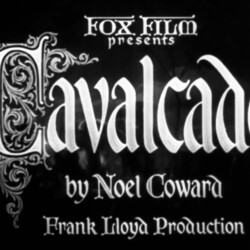SOUND FEATURES: CAVALCADE (1933)
CREDITS
Released: April 15, 1933
Production Company: Fox Film Corporation
Featured Cast: Diana Wynyard, Clive Brook, Una O’Connor, Herbert Mundin, Beryl Mercer, Irene Browne, Tempe Pigott, Merle Tottenham, Frank Lawton, Ursula Jeans, Margaret Lindsay, John Warburton, Billy Bevan, Desmond Roberts, Dickie Henderson, Douglas Scott, Sheila MacGill, Bonita Granville, Harry Allen, Frank Atkinson, Lionel Belmore, Ted Billings, Adele Crane, Nancy Crowley, Howard Davies, Kay Deslys, Mary Forbes, Betty Grable, Dannie Mac Grant, Lawrence Grant, Stuart Hall, Winter Hall, Brandon Hurst, Claude King, Bruce Line, Eric Mayne, Wilfrid North, Robert Parrish, Richard Quine, Tom Ricketts, John Rogers, Ann Shaw, C. Montague Shaw, Yorke Sherwood, Pat Somerset, Will Stanton, Mary Stewart, Gelal Talata, David Torrence, Douglas Walton, Marguerite Warner, Eric Wilton
Director: Frank Lloyd
Producer: Frank Lloyd
Cinematographer: John F. Seitz
Assistant Director: William Tummel
Editor: Margaret Clancey
Casting Director: Jack Gains
Casting Associate: Phil M. Friedman, Robert Mayo, Robert Palmer
Art Director: William S. Darling
Costume Designer: Earl Luick
Wardrobe: Men: Arnold McDonald
Makeup Artist: Charles Dudley
Unit Manager : Charles Woolstenhulme
Location Manager: R.C. Moore
Musical Director: Louis De Francesco
Musical Ensembles Stager: Sammy Lee
Music Arranger: Peter Brunelli, Edward KilenyiFrank TresseltJ.S. Zamecnik
Continuity: Sonya Levien
Sound Engineer: Joseph E. Aiken
Special Effects: William Cameron Menzies
Writers: Noël Coward (play), Reginald Berkeley (screenplay)
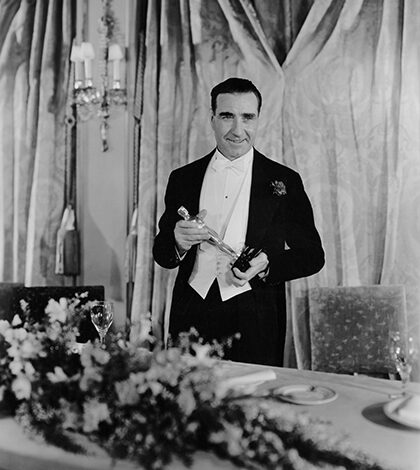
AWARDS
Won 3 Oscar Awards. Another 1 win & 1 nomination
1934
Academy Awards, USA
Won, Oscar
Best Director
Frank Lloyd
Won, Oscar
Best Picture
Nominated, Oscar
Best Actress in a Leading Role
Diana Wynyard
Won, Oscar
Best Art Direction
William S. Darling
1933
National Board of Review, USA
Won, NBR Award
Top Ten Films
STORY
Throughout the movie, the passage of years is indicated by dates on title cards, with a Medieval cavalcade marching in the background.
On New Year’s Eve 1899, upper-crust couple Jane (Diana Wynyard) and Robert Marryot (Clive Brook) return to their London townhouse to keep their tradition of toasting to the new year. Jane is worried because Robert has joined the City of London Imperial Volunteers (CIV) as an officer, and will soon be leaving to serve in the Second Boer War, where Jane’s brother is already fighting. The Marryots’ butler, Alfred Bridges (Herbert Mundin), has joined the CIV as a private and will also be leaving soon; his wife, Ellen (Una O’Connor), and her mother, Mrs. Snapper (Tempe Pigott), are worried about what will become of Ellen and their baby, Fanny, if Alfred is killed or seriously wounded in action, but Alfred remains optimistic. At midnight, the Marryot and Bridges families toast to the new century.
Shortly thereafter, Jane and Ellen bid emotional farewells to their husbands as they leave on the same ship. Jane’s friend Margaret Harris (Irene Browne) keeps her company and supports her while Robert is away. While the two women are attending an operetta, the relief of Mafeking is announced from the stage, and the audience cheers. Robert and Alfred return home, and the former is knighted for his services.
Alfred announces that he has bought a pub with money partly provided by Robert, and that he and Ellen will be leaving service and moving to a flat, along with Fanny and Mrs. Snapper. As the downstairs staff celebrates Alfred’s return, they receive news of the death of Queen Victoria.
In 1908, Alfred has become an alcoholic and is managing the pub poorly, spending the family’s rent money on drink. Ellen and Fanny (Bonita Granville) are embarrassed by Alfred’s behavior. Ellen carefully plans a social evening when Jane and her son Edward (John Warburton), now attending the University of Oxford, visit the Bridges’ flat. Ellen does not tell Alfred about the visit and lies to the Marryots that he cannot attend due to a leg injury. However, just as the Marryots are leaving, Alfred shows up at the house drunk, acts rudely, and destroys a doll that Jane had given Fanny. Fanny runs out onto the street; an angry Alfred goes after her, only to be run over and killed by a horse-drawn fire engine.
On July 25, 1909, Ellen and Fanny encounter the Marryots at the seaside, where Ellen explains that she now owns the pub and she and Fanny, who has become a talented dancer and singer, are living off its proceeds. Edward has fallen in love with his childhood playmate, Edith Harris (Margaret Lindsay). The family witnesses the historic flight by Louis Blériot over the English Channel.
In April 1912, Edward and Edith have married and are spending their honeymoon aboard a luxurious ocean liner, revealed to be the ill-fated RMS Titanic. (The couple’s death in the ship’s sinking is only briefly mentioned in later dialogue.)
In 1914, World War I breaks out. Robert and Joe (Frank Lawton), the Marryots’ other son, both serve as officers, believing the war will be over in a few months. While on leave, Joe encounters Fanny (Ursula Jeans), whom he remembers from their childhood, performing in a nightclub. He reintroduces himself to her, and they bond while witnessing a Zeppelin air raid on London from the rooftop. Fanny later becomes the star of a theatrical production. Fanny and Joe fall in love; unbeknownst to his parents, he spends most of his leave time with her. He finally proposes, but she hesitates to accept because of their class difference.
Just after armistice is announced in 1918, Ellen, who has found out about Fanny and Joe’s affair, visits Jane, reveals the relationship to her, and demands that Joe marry Fanny when he returns. Jane is surprised, but refuses to meddle in her son’s personal life. As the two women argue, Jane receives a telegram informing her that Joe has been killed in battle, and faints. Later, a grief-stricken Jane walks sadly and silently through armistice celebrations in Trafalgar Square.
Following the war, a montage shows daily life becoming even more chaotic and the social order being further disrupted, while some advocate that mankind work towards peace. The film ends on New Year’s Day 1933, with Jane and Robert, now elderly, carrying on their tradition of celebrating the new year with a midnight toast to their past memories, as well as to the future.

